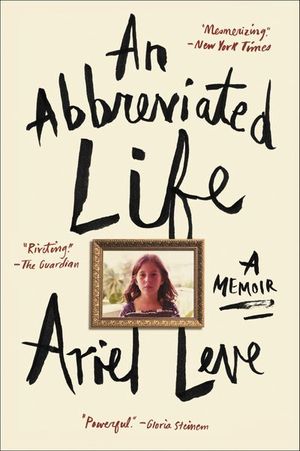An Abbreviated Life
A “mesmerizing” memoir of growing up under siege with an unstable, unreliable mother (The New York Times).
Ariel Leve grew up in Manhattan with an eccentric mother she describes as “a poet, an artist, a self-appointed troublemaker and attention seeker.” Leve learned to become her own parent, taking care of herself and her mother’s needs. There would be uncontrolled, impulsive rages followed by denial, disavowed responsibility, and then extreme outpourings of affection. How does a child learn to feel safe in this topsy-turvy world of conditional love?
Leve captures the chaos and lasting impact, and explores how the coping mechanisms she developed to survive later incapacitated her as an adult. There were material comforts, but no emotional safety, except for summer visits to her father’s home in Southeast Asia—an escape that was terminated after he attempted to gain custody. Following the death of a loving caretaker, a succession of replacements raised Leve—relationships that resulted in intense attachment and loss. It wasn’t until decades later, when Leve moved to other side of the world, that she could begin to emancipate herself from the past. In a relationship with a man who has children, caring for them yields a clarity about what was missing.
In telling her story, Leve seeks to understand the effects of chronic psychological maltreatment on a child’s developing brain, and to discover how to build a life for herself that she never dreamed possible: an unabbreviated life.
“An Abbreviated Life adds a harrowing chapter to the great tragicomedy called ‘we don’t get to choose our parents.’ [An] extremely readable memoir.” —Richard Ford, Pulitzer Prize-winning author of Be Mine
“Sometimes, a child is born to a parent who can’t be a parent, and, like a seedling in the shade, has to grow toward a distant sun. [Leve’s] memoir will remind us that family isn’t everything—kindness and nurturing are.” —Gloria Steinem, New York Times–bestselling author of My Life on the Road
“Searing . . . An unstinting portrayal of psychological abuse, both insightful and precisely told.” —John Irving, New York Times–bestselling author of A Prayer for Owen Meany
“Vividly renders the trauma she endured and her struggle to free herself from her mother . . . powerful.” —Publishers Weekly
“A haunting, indelible story . . . an act of bravery that strikes me not only as a literary achievement, but a human one.” —Dani Shapiro, New York Times–bestselling author of Inheritance
Ariel Leve grew up in Manhattan with an eccentric mother she describes as “a poet, an artist, a self-appointed troublemaker and attention seeker.” Leve learned to become her own parent, taking care of herself and her mother’s needs. There would be uncontrolled, impulsive rages followed by denial, disavowed responsibility, and then extreme outpourings of affection. How does a child learn to feel safe in this topsy-turvy world of conditional love?
Leve captures the chaos and lasting impact, and explores how the coping mechanisms she developed to survive later incapacitated her as an adult. There were material comforts, but no emotional safety, except for summer visits to her father’s home in Southeast Asia—an escape that was terminated after he attempted to gain custody. Following the death of a loving caretaker, a succession of replacements raised Leve—relationships that resulted in intense attachment and loss. It wasn’t until decades later, when Leve moved to other side of the world, that she could begin to emancipate herself from the past. In a relationship with a man who has children, caring for them yields a clarity about what was missing.
In telling her story, Leve seeks to understand the effects of chronic psychological maltreatment on a child’s developing brain, and to discover how to build a life for herself that she never dreamed possible: an unabbreviated life.
“An Abbreviated Life adds a harrowing chapter to the great tragicomedy called ‘we don’t get to choose our parents.’ [An] extremely readable memoir.” —Richard Ford, Pulitzer Prize-winning author of Be Mine
“Sometimes, a child is born to a parent who can’t be a parent, and, like a seedling in the shade, has to grow toward a distant sun. [Leve’s] memoir will remind us that family isn’t everything—kindness and nurturing are.” —Gloria Steinem, New York Times–bestselling author of My Life on the Road
“Searing . . . An unstinting portrayal of psychological abuse, both insightful and precisely told.” —John Irving, New York Times–bestselling author of A Prayer for Owen Meany
“Vividly renders the trauma she endured and her struggle to free herself from her mother . . . powerful.” —Publishers Weekly
“A haunting, indelible story . . . an act of bravery that strikes me not only as a literary achievement, but a human one.” —Dani Shapiro, New York Times–bestselling author of Inheritance
BUY NOW FROM
COMMUNITY REVIEWS

